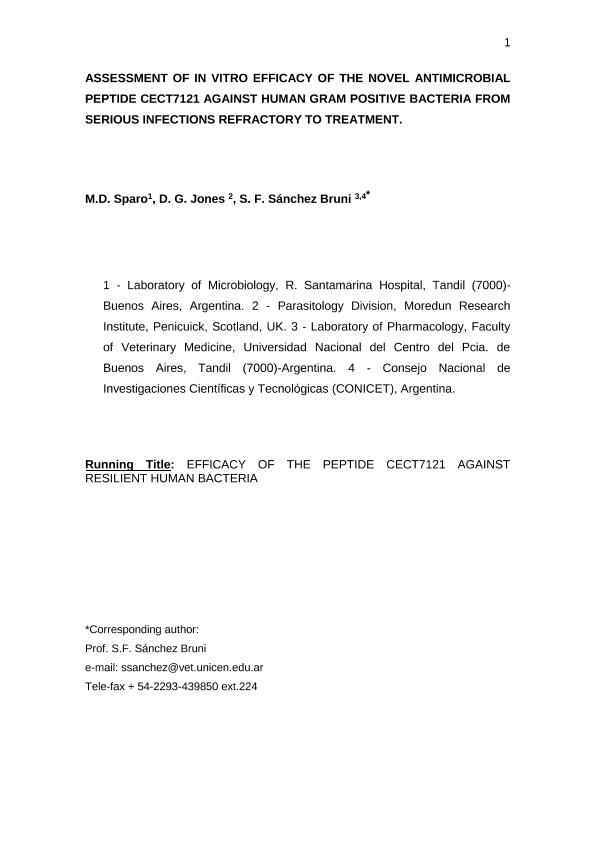Mostrar el registro sencillo del ítem
dc.contributor.author
Sparo, Mónica Delfina

dc.contributor.author
Jones, Douglas G.
dc.contributor.author
Sanchez Bruni, Sergio Fabian

dc.date.available
2020-04-24T13:21:16Z
dc.date.issued
2009-12
dc.identifier.citation
Sparo, Mónica Delfina; Jones, Douglas G.; Sanchez Bruni, Sergio Fabian; Assessment of the in vitro Efficacy of the Novel Antimicrobial Peptide CECT7121 against Human Gram-Positive Bacteria from Serious Infections Refractory to Treatment; Karger; Chemotherapy; 55; 4; 12-2009; 270-277
dc.identifier.issn
0009-3157
dc.identifier.uri
http://hdl.handle.net/11336/103525
dc.description.abstract
Background: Resistant Gram-positive bacteria are causing increasing concern in clinical practice. This work investigated theefficacy of AP-CECT7121 (an antimicrobial peptide isolated from an environmental strain of Enterococcus faecalis CECT7121) against various pathogenic Gram-positive bacteria. Methods: Strains were isolated from intensive care unit patients unresponsive to standard antibiotic treatments. Inhibitory activity of AP-CECT7121 was assessed using the agar-well diffusion method. The most resistant isolates from each species screened (Enterococcus faecium, Enterococcus faecalis,Staphylococcus aureus, Streptococcus pneumoniae, Streptococcus pyogenes, Clostridium perfringens and Clostridium difficile) were further examined in time-killing curve studies. Results: These bactericidal kinetic experiments demonstrated a rapid killing effect with no viable bacteria being detected within 30 and 90 min for enterococcal and streptococcal strains and 180 min for community-acquired methicillin-resistant S. aureus and C. perfringens: viable counts for C. difficile were threefold decreased after 90 min. Conclusions: AP-CECT7121 may provide a novel strategy for treating potentially fatal clinical infections in hospitalized patients.
dc.format
application/pdf
dc.language.iso
eng
dc.publisher
Karger

dc.rights
info:eu-repo/semantics/openAccess
dc.rights.uri
https://creativecommons.org/licenses/by-nc-sa/2.5/ar/
dc.subject
ANTIMICROBIALS
dc.subject
RESISTANCE
dc.subject
PEPTIDE CECT7121
dc.subject
HUMANS
dc.subject.classification
Ciencias Veterinarias

dc.subject.classification
Ciencias Veterinarias

dc.subject.classification
CIENCIAS AGRÍCOLAS

dc.title
Assessment of the in vitro Efficacy of the Novel Antimicrobial Peptide CECT7121 against Human Gram-Positive Bacteria from Serious Infections Refractory to Treatment
dc.type
info:eu-repo/semantics/article
dc.type
info:ar-repo/semantics/artículo
dc.type
info:eu-repo/semantics/publishedVersion
dc.date.updated
2019-11-08T15:14:39Z
dc.identifier.eissn
1421-9794
dc.journal.volume
55
dc.journal.number
4
dc.journal.pagination
270-277
dc.journal.pais
Suiza

dc.journal.ciudad
Basilea
dc.description.fil
Fil: Sparo, Mónica Delfina. Provincia de Buenos Aires. Municipalidad de Tandil. Hospital Municipal Ramón Santamarina; Argentina
dc.description.fil
Fil: Jones, Douglas G.. Moredun Research Institute. Parasitology Division; Reino Unido
dc.description.fil
Fil: Sanchez Bruni, Sergio Fabian. Universidad Nacional del Centro de la Provincia de Buenos Aires. Facultad de Ciencias Veterinarias. Departamento de Fisiopatología. Laboratorio de Farmacología; Argentina. Consejo Nacional de Investigaciones Científicas y Técnicas. Centro Científico Tecnológico Conicet - Tandil. Centro de Investigación Veterinaria de Tandil. Universidad Nacional del Centro de la Provincia de Buenos Aires. Centro de Investigación Veterinaria de Tandil. Provincia de Buenos Aires. Gobernación. Comision de Investigaciones Científicas. Centro de Investigación Veterinaria de Tandil; Argentina
dc.journal.title
Chemotherapy

dc.relation.alternativeid
info:eu-repo/semantics/altIdentifier/doi/http://dx.doi.org/10.1159/000223069
dc.relation.alternativeid
info:eu-repo/semantics/altIdentifier/url/https://www.karger.com/Article/Abstract/223069
Archivos asociados
